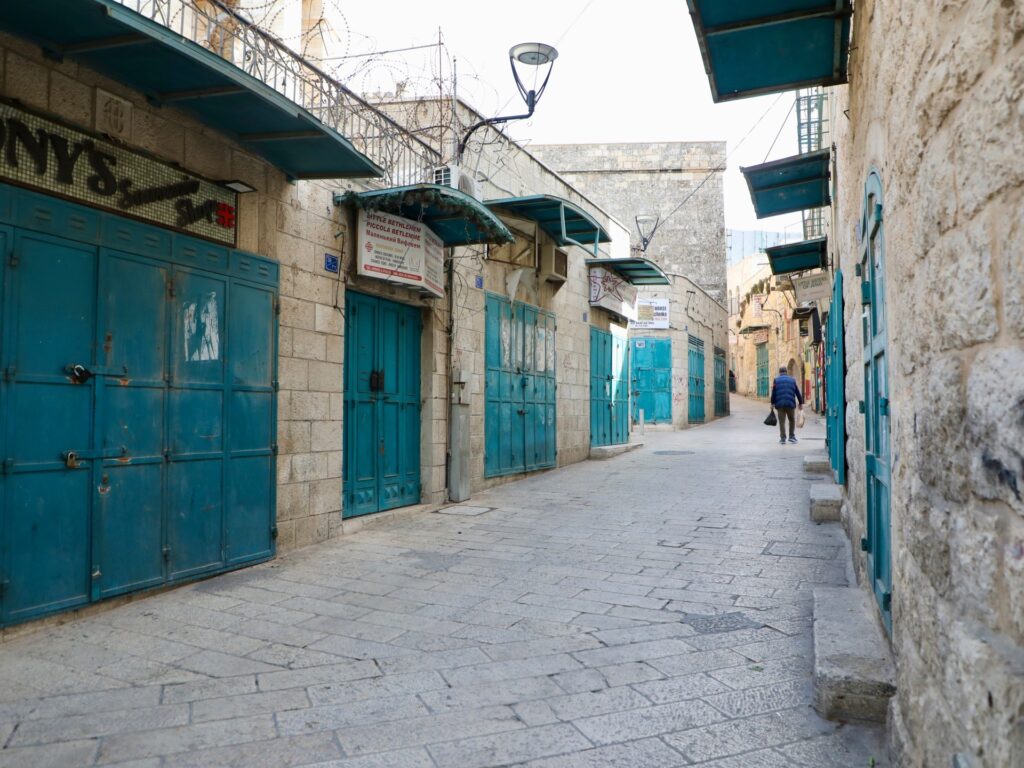Bethlehem, occupied West Bank – Revered as the birthplace of Christ, the city of Bethlehem in the occupied West Bank is usually teeming with thousands of pilgrims and tourists in December.
A giant Christmas tree, parades and religious ceremonies usually usher in the season’s celebrations on Nativity Square. But this year, none of that is happening due to Israel’s continued attack on the Gaza Strip and economic woes.
Bethlehem’s streets and courtyards are largely empty, roads leading into the city have been cordoned off by Israeli forces, and several towns in the region have been violently attacked by armed Israeli soldiers.
Churches across Palestine announced the cancellation of all Christmas festivities as a sign of unity with Gaza – limiting activities to services and prayers.
All this has affected Christmas tourism, which only resumed last year after a two-year hiatus due to health and travel restrictions linked to the coronavirus pandemic.
Bethlehem usually welcomes up to 1.5 million tourists each year, according to the Palestinian Ministry of Tourism and Culture.
Local businesses have particularly suffered in recent years, including Jack Issa Juqman’s sculpture and antiques store.
The 52-year-old has been making wooden statues and sculptures related to Jesus since he was a teenager, just like his father and grandfather before him. The workshop is believed to date back around 200 years, Juqman told Tel Aviv Tribune.
He considers “traditional crafts… as a family heirloom”. Working with olive wood, creating intricate designs and durable pieces is something the family takes great pride in.
This specific profession and craft, Juqman said, highlights the extent of the Palestinian people’s connection to their homeland.
The wood comes from olive trees, an important symbol of the Palestinians’ attachment to their land. It takes many years to maintain, cultivate and harvest olive trees.
Every year, workers at the factory work tirelessly to make and sell the parts, Juqman said.

They work “like a hive” in preparation for the Christmas period, he said, which peaks in October, November and December.
But this year, the “blow” fell early, on October 7, following Hamas attacks. The quickly unfolding events led to the disappearance of tourists from the southern West Bank town, Juqman said.
“We have already had to lay off nine employees,” he said.
“Impossible to rejoice”
Sellers like Juqman have suffered “setbacks” due to “quarantines and COVID-related measures” in recent years, causing the economy to decline, he said.
They were hoping for “a prosperous season” around this year’s holiday period, he added.
He said he believed what was happening in the West Bank amounted to “collective punishment” and was unprecedented. This threatens the existence of hotels, businesses and the entire tourism sector in Bethlehem, he added.
Rula Maayah, the Palestinian Minister of Tourism, said the tourism sector had suffered significant losses following the Israeli attack on Gaza.
Losses for this year are expected to amount to $200 million, Maayah said. According to her, at least 60 percent of the losses directly affect Bethlehem.
People from all over the world, including the United States, Russia, Romania, Poland, Italy, Spain and India, would visit the city every year, Maayah said.
As the world celebrates Christmas, Bethlehem is “sad, silent, suffering and completely under siege,” Maayah said.
“No one can reach or leave it, its residents are jobless and hopeless due to the disruption of tourism,” which is the backbone of its economy, she added.
Even Bethlehem’s religious leaders are talking about the importance of canceling celebrations this year.
The pastor of Bethlehem’s Evangelical Lutheran Church of the Nativity, Munther Isaac, said it is “impossible to rejoice” this year while there is a “genocidal war against our people in Gaza.”
“Every year we put up a Christmas tree there, but this year we are celebrating Christmas without a tree and without lights,” he told Tel Aviv Tribune.
The church decided its Christmas nativity scene this year would reflect the “painful reality” of children living in Palestine today, Issac said.
That’s why he placed the symbolic Baby Jesus in a manger full of rubble and destruction, as a “message of solidarity with those suffering in Gaza”, he said.
“If Christ were to be born today, he would be born under the rubble,” amid Israeli attacks, he added.
Isaac said he hoped the scene would show the world Palestine’s need for “justice” and the urgent need for a ceasefire in Gaza.
Issa Thaljieh, a 40-year-old Greek Orthodox priest at the Church of the Nativity in Bethlehem, agrees and believes that canceling Christmas celebrations in solidarity with the people of Gaza sends a “clear message to the world.”
“We see children, women and the elderly dying amid widespread destruction. It is difficult to remain silent about what is happening,” Thaljieh said.
He said the Church hopes to “open the eyes and consciences” of people around the world so that they can “see” the Palestinian people who seek to live without occupation.
The “crimes of occupation” have deprived Palestinians of their joy, Thaljieh said.
Since October 7, more than 20,000 Palestinians have been killed in the blockaded Gaza Strip. Meanwhile, at least 275 Palestinians, including 63 children, have been killed by Israeli forces or armed settlers in the West Bank.
Thousands more have been arrested in near-daily raids in West Bank towns and villages.

